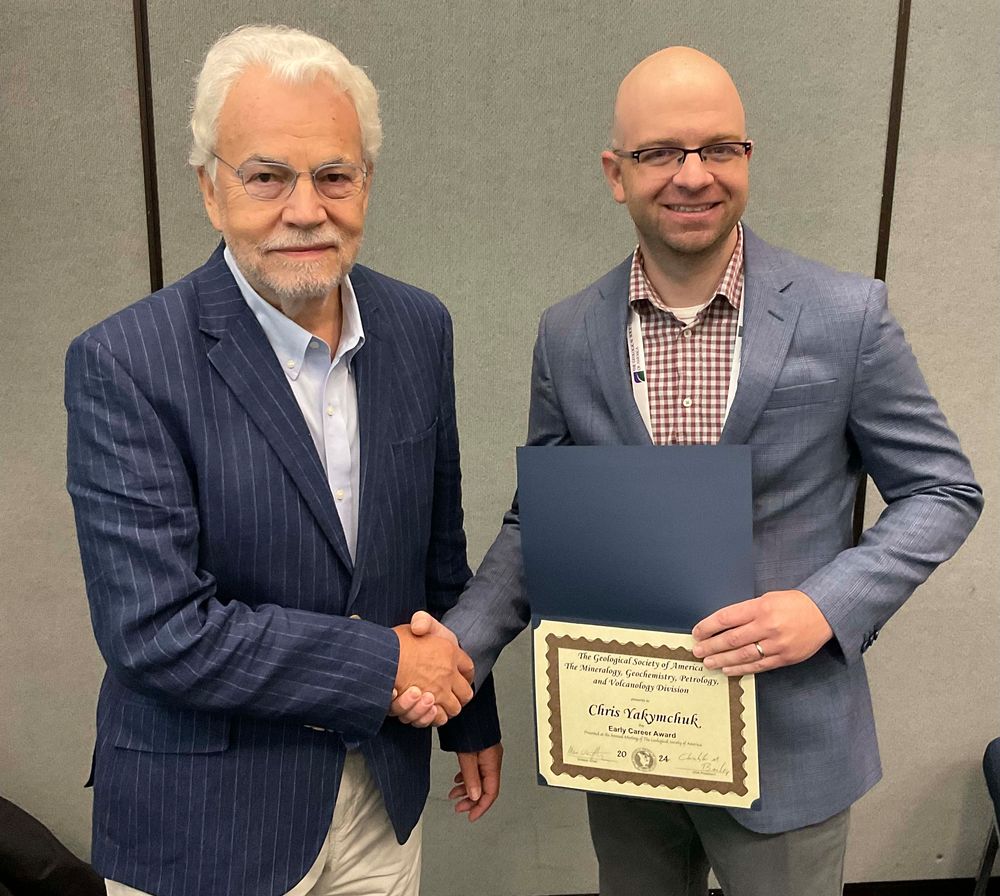Michael Brown, Director
Full c.v.
mbrown AT umd.edu
![]() Google Scholar user profile
Google Scholar user profile
NOTE: Michael Brown is not taking on new graduate students

 Rachel Pressley Kirkman (MS 1997), Michael Brown, and Gary Solar (PhD 1999) at the Department’s 50th birthday.
Rachel Pressley Kirkman (MS 1997), Michael Brown, and Gary Solar (PhD 1999) at the Department’s 50th birthday.
Research in the Laboratory for Crustal Petrology is concerned with the origin and evolution of the Earth's crust, including the pressure-temperature-time-deformation (P-T-t-d) history of crustal rocks and the processes of melting and mass transfer within the crust during orogenesis, and secular change in metamorphism, magmatism and tectonics. Currently, we have a particular interest in the evolution of supercritical fluid/melt/fluid attending ultrahigh pressure metamorphism in subducted continental crust.
 Eclogite boudins in strongly foliated gneisses viewed from cliff top, Liugong Island, Sulu belt, China.
Eclogite boudins in strongly foliated gneisses viewed from cliff top, Liugong Island, Sulu belt, China.
 Leucosome dikes cutting variably retrogressed migmatitic UHP eclogite, General's Hill, Sulu belt, China.
Leucosome dikes cutting variably retrogressed migmatitic UHP eclogite, General's Hill, Sulu belt, China.
 Shallowly-inclined surface showing leucosome dike with enclaves of retrograded UHP eclogite in lower half and retrograded migmatitic eclogite with quartz veins in upper half. Note quartz along the top edge of the leucogranite dike. These features suggest evolution from supercritical fluid to hydrous melt and aqueous fluid during exhumation across the critical curve in the granite-H2O system.
Shallowly-inclined surface showing leucosome dike with enclaves of retrograded UHP eclogite in lower half and retrograded migmatitic eclogite with quartz veins in upper half. Note quartz along the top edge of the leucogranite dike. These features suggest evolution from supercritical fluid to hydrous melt and aqueous fluid during exhumation across the critical curve in the granite-H2O system.
In the Laboratory for Crustal Petrology, our interests span the fields of mineralogy and petrology, microstructures, structural geology and tectonics, and geochemistry. Our work involves integration between field studies and laboratory studies [CHEM 2229A, the Geochemistry Laboratories and the Electron Probe Microanalyzer Facility within the Advanced Imging and Microscopy Laboratory (https://nanocenter.umd.edu/aimlab/)], and theoretical analysis and modeling (e.g. phase equilibrium modeling and petrological-thermomechanical numerical modeling).
Animation of a 2D petrological–thermomechanical tectono-magmatic numerical experiment
Animation of a 2D petrological–thermomechanical tectono-magmatic numerical experiment for conditions appropriate to a hotter early Archean lithosphere to demonstrate a variety of tectono-magmatic settings in which felsic melts can be generated from hydrated primitive basaltic crust.
For more information see the article: Sizova, E., Gerya, T., Stüwe, K. and Brown, M., 2015. Generation of felsic crust in the Archean: a geodynamic modeling perspective. Precambrian Research, 271, 198-224.
Animated CT Images of Migmatite Samples
 |
The animated gif to the left of gray scale inverted images of 112 HR X-ray CT scans of the migmatitic garnet amphibolite. First and last slices are outlined in white. Animation cycles from first to last slice (Movie 10 Mb; GIF). |
Animation of projection of false-color three-dimensional image of stromatic migmatite, derived from the stack of two-dimensional representations of the HR X-ray CT scans, created using VoxBlast® . A scale bar is not presented because these are projections of a three-dimensional image (Fig. 4(b) contains the scale for the first image in the stack). The leucosome is rendered transparent in this image. The color of the solid part of the image is brighter for material with higher mineral density, with garnet appearing yellow (Download Movie: 3MB MP4).
More information on these migmate images is available in the article: Brown, M.A., Brown, M., Carlson, W.D. and Denison, C., 1999. Topology of syntectonic melt flow networks in the deep crust: inferences from three-dimensional images of leucosome geometry in migmatites. American Mineralogist, 84, 1793-1818.
The Major John Sacheverell A'Deane Coke Medal is made to scientists for their contributions to Geology as is the case with the Lyell and Murchison Medals, but in addition recognition may be given to significant service to Geology, for example through administrative, organisational or promotional activities resulting in benefits to the community.
In recognition of valuable contributions to exploration and scientific achievement under the U.S. Antarctic program.
The Collins Medal is awarded annually to a scientist who, during a long and active career, has made an outstanding contribution to pure or applied aspects of Mineral Sciences and associated studies. Publications, teaching, outreach and other activities leading to the promotion of mineral sciences, in the broadest sense, will be taken into account in making the award.
The Fellows program was established in 1962 and recognizes AGU members who have made exceptional contributions to Earth and space science through a breakthrough, discovery, or innovation in their field. Fellows act as external experts, capable of advising government agencies and other organizations outside the sciences upon request. The program enhances the prestige of AGU and motivates members to achieve excellence in research.
The MGPV Distinguished Geological Career Award will go to an individual who, throughout his/her career, has made distinguished contributions in one or more of the following fields of research: mineralogy, geochemistry, petrology, volcanology, with emphasis on multidisciplinary, field-based contributions. This award emphasizes a geologic and multidisciplinary approach. Geological work is by nature generalistic and has an important field component, with Earth as the natural laboratory.
Virtual Seminar for Precambrian Geology (VS-PG) - November 10th, 2021 - Secular change in metamorphism tracks the emergence and evolution of plate tectonics on Earth
MSA Presidential Address: Metamorphism, Secular Change and Geodynamics (pdf)
The 51st Hallimond Lecture Time’s arrow, time’s cycle: Granulite metamorphism and geodynamics (pdf)

Michael Brown receives the Certificate commemorating the 51st Hallimond Lecture from Simon Harley.

Michael Brown acknowledges Wiley and Sons, publisher of the Journal of Metamorphic Geology, which he edited for 36 years, who sponsored a drinks reception after the Hallimond Lecture.
Piccoli, Philip M. (Advanced Imging and Microscopy Laboratory; https://nanocenter.umd.edu/aimlab/ ; and Laboratory for Mineral Deposits Research; https://www.geol.umd.edu/facilities/lmdr/)
Johnson, Tim (Curtin University, School of Earth and Planetary Sciences; https://staffportal.curtin.edu.au/staff/profile/view/Tim.Johnson)






